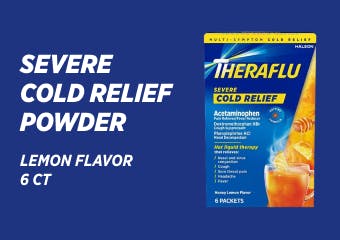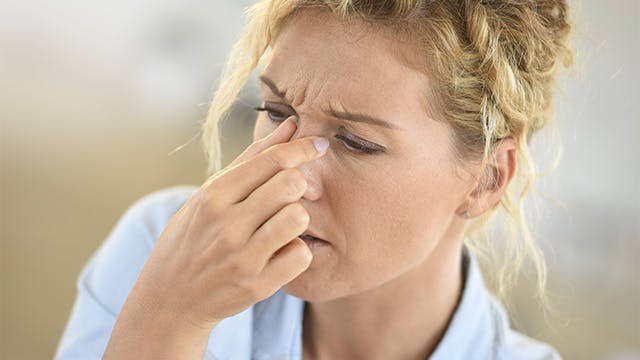What Causes Chest Congestion?
Mucus, or “phlegm,” is a key line of defense for your body. Its job is to intercept and catch irritants, which can range from household dust or smoke to cold and flu viruses, so that they can be coughed out. This is your body’s way of helping to clear your airways.1
When too much mucus accumulates in the lungs, it leads to symptoms of chest congestion. Here are two common causes of chest congestion:
Common Cold
You’re probably already familiar with the common cold: you have a runny nose, a sore throat and generally aren’t feeling your best.2 However, chest congestion and cough can also be symptoms of this common illness. The common cold is caused by a viral infection in your upper respiratory tract, which includes your nose and throat.2 The symptoms of a cold can include sneezing, body aches, mild headache and low-grade fever.2 If you suspect you have a cold, the best thing to do is get some rest and wait it out. Symptoms generally pass in seven to ten days (or slightly longer if you’re a smoker).2 There is no cure for the common cold, but there are ways to help manage your cold symptoms.
Flu
Like the common cold, the flu is a respiratory virus that may cause chest congestion.3 Symptoms can appear abruptly and may feel more severe than those associated with a cold. 3 You might experience cough, sore throat, chills, fever, body aches, headaches, fatigue, and runny or stuffy nose in addition to chest congestion.3 Most people will recover from the flu in a few days to less than two weeks.3 For information on how to manage symptoms and help relieve chest pain from flu, take a look at Theraflu’s resources on fighting the flu.
Chest Congestion Symptoms
A study conducted in 2022 interviewed a total of 49 children, adolescents and adults with the common cold about their associated symptom of chest congestion.4 The following symptoms were experienced by the study participants, without any bias towards any one age group, indicating that these are relatively common experiences by those who are experiencing chest congestion:4
- Difficulty breathing
- Chest pain
- Difficulty clearing mucus from the chest
If any of your symptoms concern you, call your doctor immediately.
When to Seek Medical Attention for the Common Cold or Flu
If you experience any of the following, seek medical attention:2,3
- Symptoms that get worse, not better
- Shortness of breath or wheezing
- Intense sore throat, accompanied by headache or sinus pain
- A fever over 101.3 degrees Fahrenheit that lasts more than three days
- Fever or cough that briefly improve, then return or worsen
- Dizziness or confusion

If your pain or cough worsens or lasts for more than 7 days, consult your doctor or healthcare provider.
How to Get Rid of Chest Congestion: Chest Congestion Remedies
There’s no doubt that chest congestion can be uncomfortable and frustrating, and the frequent coughing that it may cause can make your throat and chest sore. Luckily, there are some actions you can take to help relieve chest congestion symptoms while you recover from a cold or flu virus. These range from easy home remedies to over-the-counter medicine.
Home Remedies for Chest Congestion Relief
- Add moisture to the air. Using a humidifier adds moisture to the air in the room, which can help loosen congestion. Another option is to lean over a bowl of hot water and inhale the steam, which will help loosen phlegm and encourage a more productive cough.5
- Try honey and lemon. Mix lemon juice and honey into a glass of hot water to help reduce coughing and help loosen mucus.5
- Gargle salt water. Use warm water and be sure to spit it out when you’re done!
- Stay hydrated. Increasing the amount of fluids to drink can help to thin out mucus.5
OTC Chest Congestion Medicine
While these home remedies can help to ease some of your chest congestion symptoms, there are also cold and flu medicines available online and at your local pharmacy without a prescription that can help you manage your symptoms–like Theraflu Daytime Flu Relief Max Strength Hot Liquid Powder.
Are you battling other cold and flu symptoms other than chest congestion? Theraflu Daytime Flu Relief Max Strength Syrup can give you relief from cough, headache and body aches, sore throat and fever.
Always use products as directed and learn more about cold and flu prevention.
Mix lemon juice and honey into a glass of hot water to help reduce coughing and help loosen mucus.5






